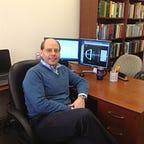Why do we think a Theory of Everything is possible?
We have barely begun my series about a possible theory of everything and there is still much to discuss. When we finished last time, we inadvertently left an important question unasked. Although I have not filled you in on the details yet, I’ve told you that the two theories we currently use to describe our universe, quantum field theory and general relativity, are mutually incompatible. Because of this, at least one of these theories must be wrong (to some degree) and perhaps both will eventually be replaced or corrected. This leads us to ask, before we continue on this journey, are we actually headed to a real destination or is this just a pipe dream?
Is a theory of everything even possible?
We might wonder, would it be possible to completely describe the universe with multiple theories (that are not mutually incompatible) that do not overlap and call that our “theory of everything”? In other words, are we sure we are looking for one theory? I suppose that depends on what we mean by multiple theories, but it is hard to imagine completely independent theories that could possibly achieve our goal. Why do I say that? Because there are realistic physical situations where all the forces are important at the same time, which means that they would have to be on an equal theoretical footing to make consistent predictions. The theory could break apart and factorize in other circumstances, which is a big part of how we currently understand the standard model and will be the topic of a future writing, but to truly be a theory of everything, it must be one theory to rule them all.
Do we have any evidence that this is possible in practice?
If anything, we have nothing but evidence that a theory of everything is possible, even if we do not have a working example. This is because throughout the history of physics, we have seen more and more phenomena fall under the umbrella of fewer and fewer theories. It was once thought that literally everything was governed by its own individual “purposes,” and we now know that everything is governed by just two theories. Optimistically, we are almost there. Realistically, we don’t know how long it will take to bridge this particular gap, but we know the destination is real even if we have to find a new path.
The history of science is often told with the benefit of hindsight, which makes many great discoveries seem obvious and inevitable. One day, I hope the story of the theory of everything will be told in the same way, with subtle breadcrumbs dropped along the narrative to show the reader how close we were all the time, or how wrong we had been all along depending on how we get there. I hope it all seems obvious from the other side, but this is not typical in science with rare exceptions.
In my opinion, the most important part of science is the confusion. A great physicist I once knew used to day, “I can teach you everything but the confusion, you must experience that for yourself.” It is when theories and experiments don’t agree that progress can be made. Sometimes the problems are great, as happened with the so-called “ultraviolet catastrophe” (that would lead to the development of quantum mechanics) and sometimes they are subtle, as with the precession of the perihelion of Mercury. We will eventually discuss both, but without disagreement there is little reason to push for more. When viewed like this, we are ideally situated to work on a theory of everything for there is much we fundamentally do not understand.
We had the first great unification in physics with Newton’s law of universal gravitation. A second great unification with Maxwell’s classical theory of electromagnetism. We had the quantum revolution and the development of field theory and the standard model. We have seen Newton’s theory give way to Einstein’s understanding of gravity. We see that unification works.
Everything we know says one day there must be a single, unified framework to describe our universe that we will call a theory of everything.
